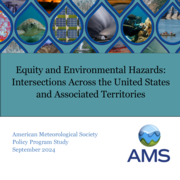Interact with this report as a StoryMap
Executive Summary
The United States and its associated territories uniquely experience challenges in weather, water, and climate (WWC); equity, inclusion, and justice (EIJ); and the intersection of WWC and EIJ, though these issues are not exclusive to any one state or territory and often transcend geographic and political boundaries. Socioeconomic and WWC vulnerabilities are inextricably linked, and historically underserved communities are disproportionately impacted by climate and weather hazards.
This study by the American Meteorological Society (AMS) Policy Program aims to 1) identify key challenges and opportunities in weather, water, and climate for the United States and associated territories; 2) assess issues and potential areas for the advancement of equity, inclusion, and justice; and 3) develop a database of challenges and opportunities in WWC and/or EIJ within each respective U.S. state or territory.
Key Findings
- The United States and its associated territories uniquely experience challenges in weather, water, and climate (WWC); equity, inclusion, and justice (EIJ); and the intersection of WWC and EIJ, though these issues are not exclusive to any one state or territory and often transcend geographic and political boundaries.
- Socioeconomic and WWC vulnerabilities are inextricably linked. Challenges in WWC can exacerbate existing socioeconomic vulnerabilities, and historically underserved communities are disproportionately impacted by climate and weather hazards.
- The adaptation of communities’ social and physical infrastructure is integral to building community resilience, improving public health and human well-being, and avoiding extensive damages and loss of life as a result of challenges in WWC.
- There are many intersections of opportunities across WWC and EIJ. Addressing challenges in WWC from a more holistic and interdisciplinary approach can also aid in rectifying issues in EIJ.
- Given the complexities and interconnectedness of challenges in WWC and EIJ, climate adaptation efforts must be tailored to communities at the local level in order to effectively build community resilience, realize opportunities in WWC and EIJ, and serve all people across the United States and associated territories.
This study synthesizes information solicited from professionals across the WWC enterprise, as well as individuals working in the EIJ space. An extensive literature review, multiple interviews with experts, and historical data on weather and climate from each state/territory has also been incorporated in an effort to provide an accurate representation of the challenges faced across the United States and associated territories. This study and database shall for the foreseeable future exist as living documents, as new insights and information from experts in each state/territory are taken into consideration.
